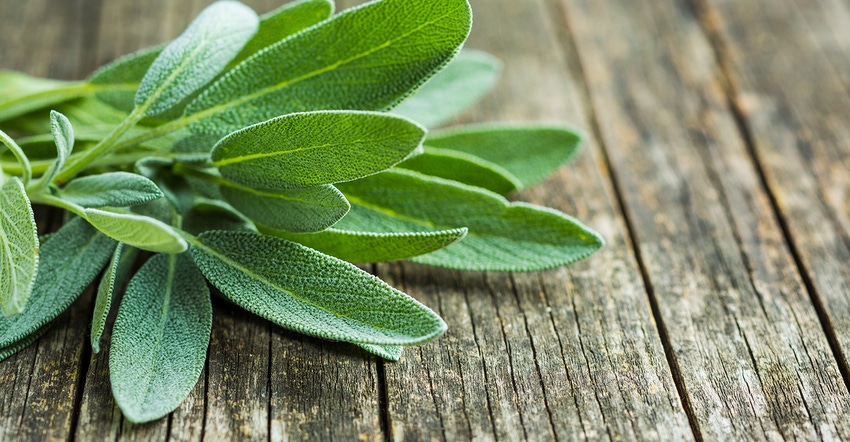Healthy aging, cognitive function and sage
Research shows that sage—which has been used in traditional medicine to support brain health—has numerous potential benefits for concentration, memory and mood.

According to the World Health Organization (WHO), healthy aging is the process of developing and maintaining the functional ability that enables well-being in older age. As people age, they change in myriad ways—both biological and psychological.
Contrary to popular belief, healthy aging is more than physical well-being alone. For consumers, health and well-being also encompass cognitive health. As a matter of fact, a 2019 Natural Marketing Institute (NMI) webinar revealed 1 in 2 adults stated that losing brain capacity was one of their biggest fears as they age.
Take a few seconds to think about how often you misplace your car keys, forget where you parked the car or blank on the name of a person you just met. We all have those frustrating “tip of the tongue” moments. However, if forgetfulness escalates to a point where it is not just memory that is affected, but focus, mood and decision-making as well, then it is time to do something about it.
Positive lifestyle interventions have the potential to increase longevity and delay the onset of age-related pathologies. To this regard, dietary supplements offer an easy and promising solution that can make a key contribution to the numerous challenges of aging. A significant body of epidemiological evidence supports beneficial effects of particular nutrients on healthy aging of the brain. This includes vitamins such as B-9, B-12 and E, as well as herbal extracts with both traditional and modern uses, such as Ginkgo biloba (ginkgo), Withania somnifera (ashwagandha), Cannabis sativa (hemp) and Salvia officinalis (sage).1
Interest is increasing in the use of cognitive-enhancing herbal medicines (known as nootropics) for memory-related disorders. In particular, research shows that sage, which has long been used in traditional medicine to support brain health, has numerous benefits for concentration, memory and mood.
Research backing
Many species of Salvia are native to Mediterranean Europe and have been traditionally used for the treatment of a range of problems including digestive and circulation disturbances, memory problems, mouth and throat inflammation, and depression. In addition, Salvia plants are noted for their antioxidant effects and ability to enhance “head and brain” function, improve memory, quicken the senses and delay age-associated cognitive decline.2
Today’s research supports this traditional knowledge with a randomized, placebo-controlled, double- blind, crossover study showing sage extract (as Sibelius:Sage) significantly improved performance cognition, such as accuracy of attention, word recognition, word recall and working memory.3 The trial participants were ages 65 and older and were given varying doses of sage. A sustained memory improvement over time was noticed and the effects of the sage on memory were seen after only an hour of taking the sage extract.
In another study, improvement of mood (calmness, feeling content) and cognitive functions (alertness) were noticed after a single dose.4 A systematic review published in 2014 found that sage exerted enhancing cognitive performance both in healthy subjects and patients with dementia or cognitive impairment.5
How it works
Several mechanisms of action can be suggested for the cognitive and memory-enhancing effects of sage. Researchers have identified at least six areas which influence physiological pathways, including cholinergic, neurotrophic, anti-inflammatory, antioxidant and anxiolytic/anti-depressive activities, as well as potential protective benefits against amyloid-beta peptide toxicity.2 One of the primary areas of focus is its impact on neurotransmitters.
Sage extracts have been shown to inhibit the action of acetylcholinesterase; the enzyme that breaks down the neurotransmitter acetylcholine. Acetylcholine is found in the brain in areas associated with attention, memory and motivation.
Formulating for success with sage
Sage is an extremely dynamic ingredient that can be integrated in any cognitive product line. As consumers gain more awareness of sage’s functional benefits, opportunities are arising for more sage products in more diverse formats. For example, raw extract powder is suitable for more traditional applications, such as tablets and capsules; and a new micronized format facilitates the formulation of innovative finished products, such as beverages, jellies, gummies and functional food.
The webinar “Botanicals for Cognitive Health” highlights the versatility of this ingredient. The synergistic combination of sage with other botanicals for cognition—such as Bacopa, ashwagandha, blueberry and American ginseng—can create a stronger and potentially more successful formulation for cognition.
Aging poses significant challenges to individuals and society. Traditionally, cognitive well-being has perhaps been perceived as a concern limited to the senior years; however, the importance of supporting healthy brain function among all generations is constantly growing. With the advancements of clinical data, the opportunity emerges to show that natural healing remedies can be among the potential solutions to help improve health for all generations.
Gioia Zambon manages Sibelius’ internal and external communications programs—including public relations and social media—across multiple markets. The company focuses on the need to support healthy aging and the increasing market demand for branded, scientifically evidenced and clinically proven natural products. Its mission is to increase people’s health span and well-being by unlocking the potential of natural products.
References
1 Meeusen R, Decroix L. "Nutritional Supplements and the Brain." Int J Sport Nutr Exerc Metab. 2018;28(2):200-211.
2 Lopresti AL. “Salvia (Sage): A Review of its Potential Cognitive-Enhancing and Protective Effects.” Drugs R D. 2017;17(1):53-64.
3 Scholey AB et al. “An extract of Salvia (sage) with anticholinesterase properties improves memory and attention in healthy older volunteers.” Psychopharmacology (Berl). 2008;198(1):127-139.
4 Tildesley NT et al. “Positive modulation of mood and cognitive performance following administration of acute doses of Salvia lavandulaefolia essential oil to healthy young volunteers.” Physiol Behav. 2005;83(5):699-709.
5 Miroddi M et al. “Systematic Review of Clinical Trials Assessing Pharmacological Properties of Salvia Species on Memory, Cognitive Impairment and Alzheimer's Disease.” CNS Neurosci Ther. 2014;20:485-495.
About the Author(s)
You May Also Like






.png?width=800&auto=webp&quality=80&disable=upscale)